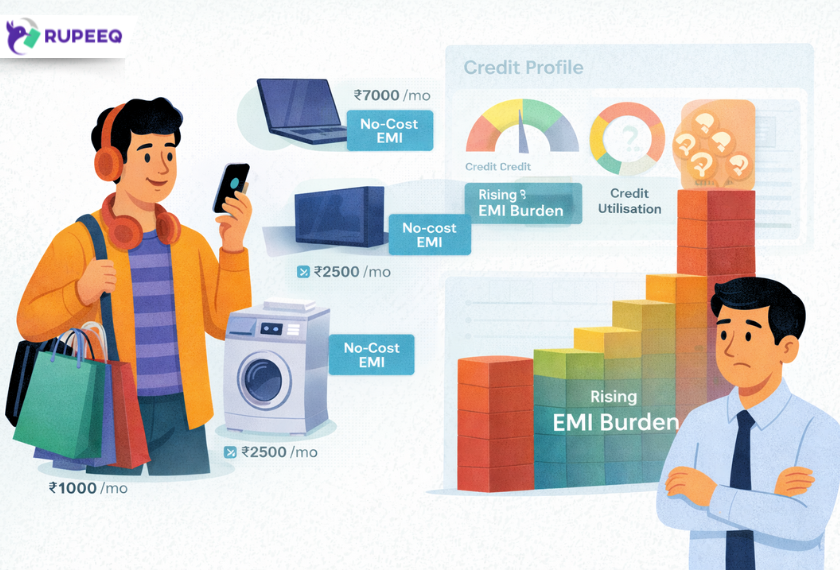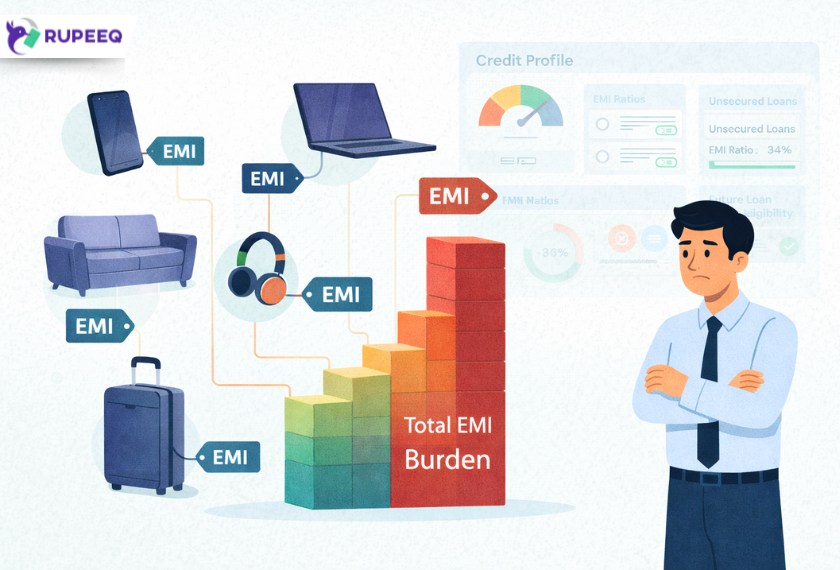When applying for a personal loan, home loan, car loan, or credit card, one of the first things lenders check is your credit history. A strong credit history improves your chances of loan approval, helps you secure lower interest rates, and increases your borrowing limit. On the other hand, a poor credit history can lead to higher interest rates or outright loan rejection.
Understanding how credit history impacts loan eligibility can help you take the right steps to build and maintain a strong financial profile.
In this blog, we will cover:
- What is credit history?
- How lenders evaluate your loan application based on credit history
- The benefits of having a good credit history
- How to improve and maintain a strong credit profile
- RupeeQ insights on maximizing your loan eligibility
1. What is Credit History?
Credit history is a record of how you have managed loans and credit in the past. It is reflected in your credit report, which is maintained by credit bureaus such as CIBIL, Experian, Equifax, and CRIF High Mark.
Your credit history includes:
- Previous and current loan accounts, such as personal loans, home loans, and credit cards.
- Payment behavior, including whether you pay EMIs and credit card bills on time.
- Defaults and late payments, if any.
- Credit utilization ratio, which measures how much of your credit limit you are using.
- Hard inquiries, which reflect the number of times you have applied for loans or credit cards.
A positive credit history indicates responsible borrowing and increases your loan eligibility, while a poor history can make lenders hesitant to approve your loan.
How Credit History Affects Loan Approval
Lenders use your credit history to assess whether you are a high-risk or low-risk borrower. The key factors they consider include:
High Credit Score (750 and above): Easier Loan Approval
- A strong credit history ensures quick loan approvals.
- Banks and NBFCs offer lower interest rates for borrowers with good credit.
- Borrowers with high credit scores are eligible for higher loan amounts and pre-approved offers.
Low Credit Score (Below 650): Risk of Loan Rejection
- A poor credit history reduces loan approval chances.
- Even if approved, the interest rates are much higher.
- The lender may require additional documents or a guarantor.
Example: Impact of Credit Score on Loan Approval
| Credit Score | Approval Chances | Interest Rate | Loan Limit |
| 750 and above | High | 10% – 12% | ₹5 – ₹50 lakh |
| 650 – 749 | Moderate | 12% – 18% | ₹1 – ₹10 lakh |
| Below 650 | Low | 18% – 24% | ₹50,000 – ₹5 lakh |
RupeeQ Tip – Before applying for a loan, check your credit score & history score using RupeeQ ACE, powered by CRIF. If your score is low, improve it before submitting a loan application.
Benefits of Having a Good Credit History
Maintaining a strong credit history not only improves loan eligibility but also provides the following advantages:
Lower Interest Rates on Loans
Lenders offer lower interest rates to borrowers with a good credit history, reducing the total cost of borrowing.
Higher Loan Amounts
A strong repayment track record increases borrowing limits, helping you secure larger loans when needed.
Faster Loan Approval Process
Lenders quickly approve loans for applicants with a clean credit record, reducing processing time.
Eligibility for Pre-Approved Loans
Banks and NBFCs often offer pre-approved personal loans to customers with excellent credit history, providing instant funds without documentation.
Higher Credit Card Limits
A good credit history qualifies borrowers for premium credit cards with higher limits, rewards, and benefits.
How to Improve Your Credit History and Increase Loan Eligibility
If your credit history is weak or your credit score is low, take the following steps to improve it and boost your loan eligibility:
Pay EMIs and Credit Card Bills on Time
Timely payments improve your credit score and show lenders that you are responsible with credit.
Maintain a Low Credit Utilization Ratio
Keep your credit utilization below 30 percent of the total credit limit. For example, if your credit limit is ₹1 lakh, try not to use more than ₹30,000 per month.
Avoid Multiple Loan Applications in a Short Period
Every loan application results in a hard inquiry, reducing your credit score. Apply for loans only when necessary.
Diversify Your Credit Mix
A mix of secured loans, such as home or car loans, and unsecured loans, such as personal loans and credit cards, shows balanced credit usage.
Check Your Credit Report for Errors
Errors in credit reports can lower your score unfairly. Use RupeeQ free credit score check to monitor and dispute inaccuracies.
Do Not Close Old Credit Accounts
Longer credit history improves your score. Even if you do not use an old credit card, keeping it open helps maintain a positive credit record.
RupeeQ Tip – If your credit score is below 700, consider taking a small personal loan and repaying it responsibly to build credit history.
Common Mistakes That Can Hurt Your Credit History
Missing Loan EMIs or Credit Card Payments
Late or skipped payments remain on your credit report for up to seven years.
Keeping High Credit Utilization
Using more than 50 percent of your credit limit frequently lowers your score.
Closing Credit Cards Too Soon
Older accounts help maintain a longer credit history. Closing them can negatively impact your score.
Applying for Too Many Loans at Once
Frequent loan applications reduce your score and make lenders see you as a risky borrower.
Build and Maintain a Strong Credit History for Better Loan Eligibility
Your credit history plays a crucial role in determining loan approval, interest rates, and borrowing limits. Maintaining a good repayment record, low credit utilization, and a mix of credit accounts can improve your financial standing.
Key Takeaways
- A credit score of 750 and above improves loan eligibility and reduces interest rates.
- A good credit history leads to faster approvals and higher loan amounts.
- Timely EMI and credit card payments build a positive credit profile.
- Avoid multiple loan applications in a short period to protect your score.
- Check your credit history regularly using RupeeQ ACE to stay on top of your financial health.
Want to improve your loan eligibility? Check your free credit score with RupeeQ today and take control of your credit history.







